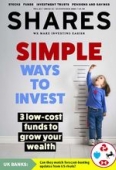Archived article
Please note that tax, investment, pension and ISA rules can change and the information and any views contained in this article may now be inaccurate.
Oxford Nanopore puts London back on map for modern company IPOs

In recent months market commentators have highlighted the diminishing appeal of the London equity market as a destination for fast growing life science and technology companies to make their stock market debut. However, there are still reasons to be optimistic.
A fifth of all companies that undertook an IPO (initial public offering) in 2005 selected the London Stock Exchange. A decade and a half later London’s share of IPOs had dropped to 4%, and the number of companies listed on it has fallen by 40% since the peak in 2007.
The FTSE 100 has a preponderance of old economy banking, mining and energy stocks. Technology stocks account for less than 2% of its value. This compares with a figure of 39% for the S&P 500,
its American equivalent.
However, two recent IPOs, DNA sequencing group Oxford Nanopore (OMT) and Made Tech (MTEC:AIM), a provider of digital, data and technology services, suggests a brighter future for London’s IPO market in terms of attracting science and technology businesses.
BREAKTHOUGH BIOTECH LISTING
Oxford Nanopore is the London Stock Exchange’s first major biotech listing since 2014 and is amongst the five largest in Britain this year.
It produces rapid Covid tests and pocket size DNA sequencing devices. The latter are used for a range of purposes, including diagnosis and treatment of diseases.
Sequencing allows healthcare practitioners to determine if a gene or the region that regulates a gene contains changes called variants or mutations that are linked to a disorder.
Traditionally the DNA sequencing market has been dominated by American companies like $68 billion Illumina which listed on
NASDAQ in 2000.
Oxford Nanopore’s technology offers two advantages over conventional alternatives. Its compact size is a key differentiator that enables field analysis, circumventing the need to send samples to a laboratory.
Another distinguishing feature is its speed. Conventional DNA sequencing technologies are time consuming and involve the use of chemicals to identify sliced DNA fragments. The current record for sequencing an entire human genome is 13 hours. Oxford Nanopore believes it can reduce this significantly to a handful of hours.
DOES IT MAKE MONEY?
The group is currently loss-making. Last year it recorded losses of £73 million on revenues of £114 million. It hopes to become profitable within five years.
The success of the group is contingent upon the growth in the market for gene sequencing. Julian Roberts, an analyst at Jefferies, estimates the global market to be worth $7.5 billion a year. The rapid decline in the cost of real-time gene sequencing is likely to engender new uses, which would augment growth.
Shares in Oxford Nanopore were priced at 425p for its IPO and the price surged by 44% on its 30 September London market debut to 612.6p, pushing the market capitalisation to £4.3 billion. After a small dip in the second week of October, the they’ve since moved up to 620p.
This successful start as a listed company provides an encouraging indication regarding the future vibrancy of the London equity market.
The firm decided to list in London rather than America which runs counter to conventional thinking. This suggests the UK offers a more educated investor base, increasingly aligned to the needs of life science and technology companies. Chief executive Gordon Sanghera maintains that Oxford Nanopore went through a ‘thorough and rigorous process before choosing London’.
The success of Oxford Nanopore’s IPO may encourage other biotech firms to follow suit and will assist the UK Government’s recent attempts to woo British life science and technology companies to list in the capital.
DYNAMIC DATA
Made Tech, a provider of digital, data and technology services to the UK public sector, is another example of a dynamic high growth company that has taken the decision to list on the UK stock market.
The company joined AIM on 30 September, raising £85.4 million at an issue price of 122p. The shares have since risen 13% to 138.1p. It’s very similar in nature to Kainos (KNOS) whose share price has risen by 934% over the past five years.

Made Tech’s clients include a multitude of government agencies. These include the DVLA, where it is working on services for provisional driving licences, and HMRC which has employed Made Tech to assist with its multi-channel digital
tax platform.
Half of the six highest spending 4K government organisations like The Ministry of Justice are clients. Made Tech also works with local authorities like the London Borough of Hackney where it is helping to improve a range of housing services for staff and residents.
The group has achieved 89% compound annual revenue growth over the last three years. The nature of the government contracts provides long-term visibility, characterised by sticky repeatable revenues.
KEY FOCUS
Made Tech works in three primary areas: digital services, legacy modernisation and embedded capabilities, the latter involves going into organisations and helping to modernise the skills that exist and the ways of working.
The opportunity in the market for Made Tech is based around the UK Government’s desire to change the way citizens interact with the state. This is being driven by the digital transformation of services.
The UK Government is becoming a more intelligent buyer and is acquiring technology from a new breed of technology supplier. Made Tech is a key beneficiary of this process and believes there are significant opportunities in the health, local government and defence sectors.
The IPO has provided capital to execute on the group’s growth plan that involves opening new locations and bringing new services to market. Longer term the group is considering international expansion.
The corporate governance and associated scrutiny associated with being a public listed company should provide customers with increased comfort about buying its services.
Important information:
These articles are provided by Shares magazine which is published by AJ Bell Media, a part of AJ Bell. Shares is not written by AJ Bell.
Shares is provided for your general information and use and is not a personal recommendation to invest. It is not intended to be relied upon by you in making or not making any investment decisions. The investments referred to in these articles will not be suitable for all investors. If in doubt please seek appropriate independent financial advice.
Investors acting on the information in these articles do so at their own risk and AJ Bell Media and its staff do not accept liability for losses suffered by investors as a result of their investment decisions.
Issue contents
Editor's View
Feature
Great Ideas
- XP Power lining up M&A drive
- Time to buy into SAP’s cloud shift before the market catches up
- Small cap consumer goods firm shrugs off supply chain issues
- Disney still a great long-term investment despite film delays
- Buy wholesaler Kitwave which is firmly in the driving seat
- QiniteQ sell-off represents a good buying opportunity
News
- What to expect in the latest updates from UK banks
- Life sciences property investor to break new ground
- Bitcoin ETF optimism feeds latest cryptocurrency rally
- Uranium’s glowing performance amid energy crisis
- ProCook and Stelrad plot main market flotations
- China could export inflation to the rest of the world

 magazine
magazine








